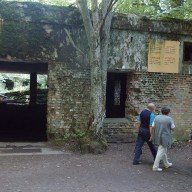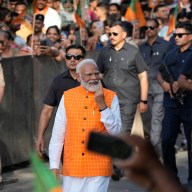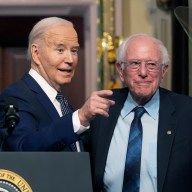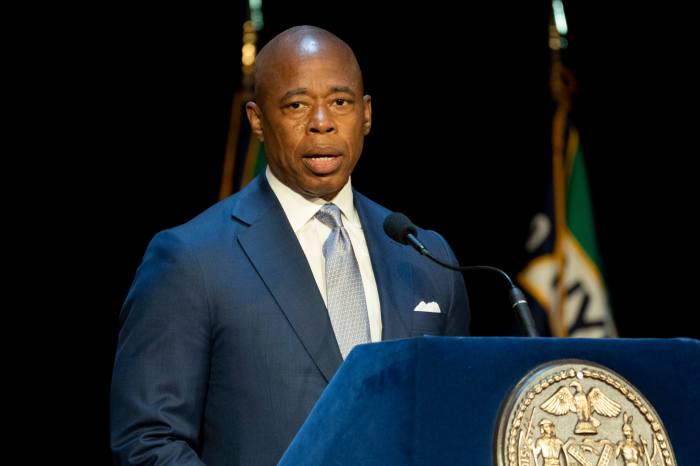 The crazed life of Dennis Hopper, seen here in his mugshot, is retold in Tom Folsom’s biography “Hopper”
The crazed life of Dennis Hopper, seen here in his mugshot, is retold in Tom Folsom’s biography “Hopper”
Credit: Eyevine-Redux
Dennis Hopper — actor, director, artist and husband to Michelle Phillips for eight days — died in 2010 having never put his turbulent life down on paper. Enter Tom Folsom. The documentarian and writer — of the bestseller “The Mad Ones: Crazy Joe Giallo and the Revolution at the Edge of the Underworld” — turns to another stranger-than-fiction life with “Hopper: A Journey Into the American Dream,” a slim and rollicking ride culled from hundreds of interviews and much digging through myths.
Hopper died in 2010. When did you get the idea for this book?
Late 2009, I’d say. There was that whole tabloid divorce, there was this big book of his photos that came out. I had gotten a book deal and I thought I’d try to help him finish his memoirs. He’d been trying to do his book for 30 years, and he just never got anything on the page. I write a lot about gangsters and American outlaws, and Dennis’ story to me had that outlaw quality to it. He was dangerous — you can see it on-screen where you’re watching “Apocalypse Now.” Without taking anything away from his acting, but I felt his life was greater than any of the roles he played.
Did you get to meet him before his death?
No, I didn’t. I was able to have a great heart-to-heart conversation with Peter Fonda for three hours over tequila at the Bevery Willishire. He was really quite honest about him. They were these two kids: he was the star of Roger Corman motorcycle movies, and Hopper was this out-of-work contract player. He was on the way down when he was doing “Easy Rider.” He was blackballed by Warner Bros. and they went down to New Orleans, shooting on 16mm and it was chaos. And out of that they revolutionized Hollywood. And after that? It’s a disillusion of their friendship. Fonda was kicked out of Hopper’s funeral. I thought it was pretty tragic.
When you were interviewing people, how did people talk about Hopper? I imagine some were less keen on him than others.
I found they were very open. They were almost confessionals. Hopper had just died and he was fresh in their minds. They sort of unburdened themselves with these stories. I got some really raw, really honest and thoughtful interviews about Hopper.
At the start you quote that Kris Kristofferson song: “He’s a walkin’ contradiction, partly fact and partly fiction.” How much of this book is fact and how much fiction?
For me the idea was to show that interplay. This is based on hardcore historical research. I went through old Warner Bros. files to find the story of the three-day showdown between Hopper and [director] Henry Hathaway [on the set of “From Hell to Texas”]. Then you talk to Don Murray, the star of that movie, and he was like, “Well, Dennis was definitely really, really difficult, but I don’t remember a three-day showdown.” I wanted to show both sides: you get to have Dennis in his element, telling his stories, and you counterbalance with the other side. A lot of times those two blend. Did he really go out and shoot a tree because he thought it was a bear? Yeah, he actually did.
It’s not a dry doorstop that upchucks facts. It doesn’t even mention all of his films, and others — like 1957’s “The Story of Mankind,” in which he was cast as Napoleon — you allude to but don’t mention by name.
Well, you can go on Wikipedia for that stuff nowadays. It relieves that burden if you want to do something interesting. A writer finds the truth and compiles a narrative. If you want to learn about all his films it’s just a click away.
What perspective did you want to take on his life?
Dennis Hopper lived his life like it was a movie, but he never got that down on the page. I felt like I wanted to capture that spirit. I wanted to find out what was this crazy movie that begins with a boy in Texas and takes him to the top of a mountain in Peru, flying in his cast, hauling horses up the mountain, with tons of cocaine and tripping on acid. And the end of the ride is the guy is sick and watching old cowboy movies. I thought it was a real narrative.
















